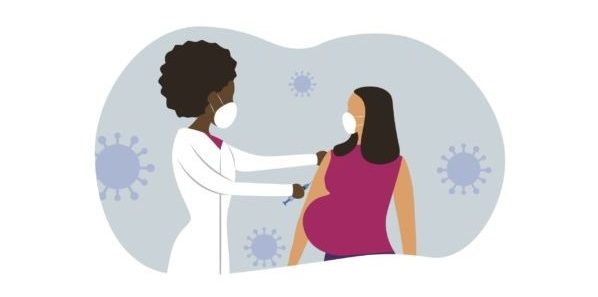Pregnant Women are More Likely to Be Infected With the COVID (SARS-CoV-2) Virus AND to Have a More Severe Case of COVID-19 Than Non-Pregnant Women.1
Why are Pregnant Women So Vulnerable to COVID?
Because growing a baby takes work and puts a strain on the immune system. In fact, a woman’s immune system “adapts and changes” as her fetus grows and develops. Some of these changes are beneficial, while others make Moms-to-be more susceptible to certain viruses. Moreover, the pregnancy hormones, estrogen and progesterone, cause the upper part of the respiratory tract to swell, making pregnant women more vulnerable to respiratory illnesses. In addition, Mom-to-be’s lungs get a bit “squished” as the baby gets bigger, making it harder for her to clear viruses out of her lungs.
And Not to Be MORE of a Debbie Downer, But the COVID-19 Virus Also Increases Mom-to-Be’s Risk of Preterm Delivery and Stillbirth.2
Reality Check: Stillbirth from COVID is super rare. Plus, the placenta appears to be a pretty good barrier against the COVID virus, given that only 5% of babies born to COVID-19 positive Moms get infected themselves.3
I’d Like to Avoid All of the Nonsense You Just Talked About!
Yup! I hear you. The good news is there are certain precautions that you can take to decrease your risk of getting COVID-19 during pregnancy, many of which you’re probably taking already.
Here are a Few Tips to Help You Protect Yourself AND Your Developing Fetus From COVID-19.

1. PediaTip #1: Avoid Sick People.
You have a good excuse not to want to get coughed on and snotted on by a sick friend, family member, or co-worker.
2. PediaTip #2: Wash Your Hands Frequently and Let it Rain Hand Sanitizer.
Although SARS-CoV-2 is mostly spread through respiratory droplets (and less commonly through touching surfaces), handwashing (for at least 20 seconds) and the use of hand sanitizers with at least 60% ethanol in them are still worthwhile practices in the fight against COVID-19 and other diseases.4
3. PediaTip #3: Consider Wearing a High Quality Face Mask Especially When You Use Public Transportation OR When You Find Yourself in an Indoor Public Space in an Area With a High (or Even Medium) “COVID-19 Community Level. Get Wise About Which Face Masks Get the Thumbs Up.
4. PediaTip #4: Get the COVID-19 Vaccine (Both the Primary Series and the Bivalent Booster Shot).
Both the Centers for Disease Control and Prevention (the CDC) and the American College of Obstetricians and Gynecologists (ACOG) recommend that pregnant women get vaccinated against COVID-19.5
Tell Me More…
All of the COVID-19 vaccines on the market for adults are approved for use in pregnant women. These include the Pfizer-BioNTech, Moderna, Johnson & Johnson, and Novavax vaccines (although, as you’ll see below, the Johnson & Johnson vaccine is a last resort).
Which of the 4 Vaccines Should I Get? Most pregnant women end up getting either the Pfizer or the Moderna COVID vaccine since more research has been done on these vaccines and both Pfizer and Moderna have a bivalent booster shot on the market. This booster shot not only protects against the original SARS-CoV-2 virus, but it provides immunity against the Omicron subvariants BA.4 and BA.5, as well. The bivalent booster shot must be given at least 2 months after you complete your primary series (i.e. the 2-shot series for the Pfizer, Moderna, and Novavax vaccines).
Note: Novavax doesn’t have a bivalent booster shot yet. You’re free to mix and match the bivalent booster shots, though, meaning the brand of booster shot that you get doesn’t have to be the same brand as the primary series you received.
Insider Info: The Pfizer and Moderna COVID-19 vaccines are mRNA vaccines, whereas the Novavax vaccine is a type of “subunit protein vaccine.” Translation: The Pfizer and Moderna COVID vaccines use a different (and newer) mechanism of action than the more old-school Novavax COVID vaccine.
Why is the Johnson & Johnson COVID Vaccine Frowned Upon in Pregnant Women?
As you may (or may not) remember, the Johnson & Johnson vaccine ran into some issues when a small number of patients experienced blood clots after getting it. Pregnancy is a “hypercoagulable state” (meaning that your blood is thicker than usual when you’re pregnant). Because of this, women are already (naturally) predisposed to blood clots when they have a bun in the oven. Therefore, the Johnson & Johnson vaccine, which already has a reputation of making (a small fraction of) people hypercoagulable, isn’t the preferred option during pregnancy and is only recommended for pregnant women who don’t have an alternative.6
Common Questions About the COVID-19 Vaccine During Pregnancy

Does It Matter When I Get the COVID Vaccine During My Pregnancy (For Example Is It Better To Get it During the First Trimester or the Third Trimester)?
No. It doesn’t matter when you get the COVID vaccine during your pregnancy. Therefore, it’s best to get it as soon as it becomes available to you (if you haven’t gotten it already). This goes for the booster shot too.
Can I Get The Other Vaccines That I Need During My Pregnancy (Such as the Flu Shot and the Tdap Booster Shot) at the Same Time That I Get My COVID Vaccine?
Yes.
Insider Info: The Tdap vaccine, which protects against tetanus (a major wound infection), diphtheria (a severe throat infection), and pertussis (a respiratory illness that’s also known as whooping cough) is typically given between 27-36 weeks of pregnancy (during each pregnancy). It’s ok to get the COVID-19 vaccine (and the flu vaccine) with your Tdap booster during that time.7 That being said, don’t postpone getting your COVID-19 vaccine or your flu shot while you wait to get your Tdap booster.
Do The COVID-19 Vaccines Cause Infertility?
There’s no evidence to suggest this.8
Are There Any Scary COVID-19 Vaccine Side Effects That Pregnant Women Should Worry About?
There are no known scary COVID-19 side effects specific to pregnant women. However, pregnant women do experience some of the “run-of-the-mill” side effects typically seen with COVID vaccines (think: fevers, chills, soreness at the injection site, muscle aches, and fatigue). Although there are no longterm studies on the effects of the COVID vaccine on pregnancy & on the developing fetus, the benefits of receiving the COVID-19 vaccine currently outweigh the potential risks of getting it (per the CDC and ACOG).
Heads Up: If you spike a fever after you get your COVID-19 vaccine (or any other vaccine) during pregnancy, be careful about what fever reducer you use (if any). NSAIDs (think: ibuprofen, aspirin, and Advil) should be avoided during the first and third trimesters (unless your doctor says otherwise).
Tylenol, though the safer of the two options, has its own risks. For example, new studies show that children born to Moms who took Tylenol for prolonged periods of time during pregnancy, had a slightly increased risk of Attention Deficit Hyperactivity Disorder (ADHD), Autism Spectrum Disorder, and asthma.9
Does the COVID-19 Vaccine CROSS the Placenta?
No, but the antibodies that Mom-to-be makes in response to the COVID-19 vaccine, DO cross the placenta and protect the baby (which is what we want).
Sneak Peek: Breastfeeding & COVID
The CDC and ACOG Say It’s Safe to Get the COVID-19 Vaccine If You’re Breastfeeding.10
Should I Continue to Breastfeed If I Contract COVID?
Yes. Studies suggest that COVID-19 isn’t spread through breast milk.11 Morever, the protective antibodies that you make against the COVID-19 virus, DO get into the breast milk (which is a good thing). These antibodies can be transferred to your baby through breastfeeding. If you’re nursing and you have COVID you should wear a mask so that you’re not breathing and coughing all over your baby and spreading the virus to him/her that way. Wash your hands before you breastfeed (or pump), as well.
The Bottom Line
Pregnant women are at a higher risk of getting hit hard by COVID-19 infections. With that in mind, control what you can and take the precautions above.
A Parting PediaTip: If you’re pregnant and you’re planning to get a COVID-19 vaccine (as part of your primary series or as a booster shot), you may want to enroll in the CDC’s “V-Safe After Vaccination Health Checker.” It’s a self-reporting online tool that allows you to share how you’re feeling after you get your COVID-19 vaccine.
What’s In It For Me? Mostly just good karma, at this point. The more people who do it, though, the more information the CDC will have about how the different COVID-19 vaccines affect pregnant women.





